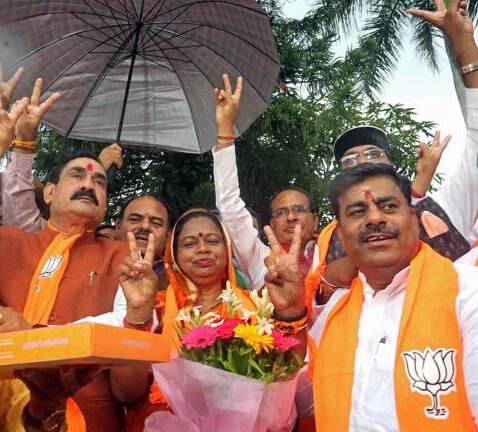New Delhi: Out of 6,671 councilors elected to local bodies in Madhya Pradesh last week, 92 were contesting on Bharatiya Janata Party (BJP) tickets. According to party leaders, this was the first time the BJP had distributed tickets to 380 Muslims for local body elections in MP – compared to less than 50 in the previous elections in 2014.

Many were surprised by the victory of Muslim candidates of the BJP in wards considered Congress strongholds. BJP’s Muslim candidates also came second in 209 wards, defeating Hindu Congress candidates in at least 25 wards.
Compared to 2014 when the number was 400, this time the Congress fielded 450 Muslim candidates, of which 344 won.
According to the 2011 census, Muslims constitute 6.57 percent of the population of Madhya Pradesh.
For example, in Anuppur, Abdul Kalam of BJP defeated Ashok Tripathi of Congress. In Katni, BJP’s Mohammad Ayaz defeated Congress candidate Mohanlal, while in Ujjain, Congress’ Vaishali was defeated by BJP’s Abida Bi.
According to party leaders who spoke to ThePrint, this was the fruit of a strategy to divide the Muslim vote to win victory in Muslim-majority wards where the BJP could already rely on Hindu votes.
But although the BJP fielded Muslim candidates in smaller towns, the party took a different route in cities including Bhopal, Indore and Jabalpur, where no tickets were given to Muslims.
State BJP spokesperson Hitesh Bajpai said that this is a victory of Prime Minister Narendra Modi’s effort to involve all communities in India’s development journey.
“The vote [by Muslims for the BJP] has shown faith in our policy of Sabka Saath, Sabka Vikas (support for all, development for all). Our Muslim candidates defeating Congress’ Hindu candidates has signaled a significant change in the politics of the state.
In the local body elections, the BJP won 24 out of 40 municipal councils and 123 out of 169 municipal councils. Party sources said it has a majority in around 80 per cent of the municipal corporations and councils in the state.

